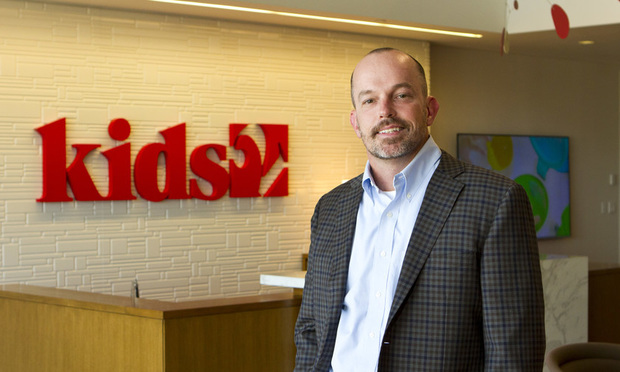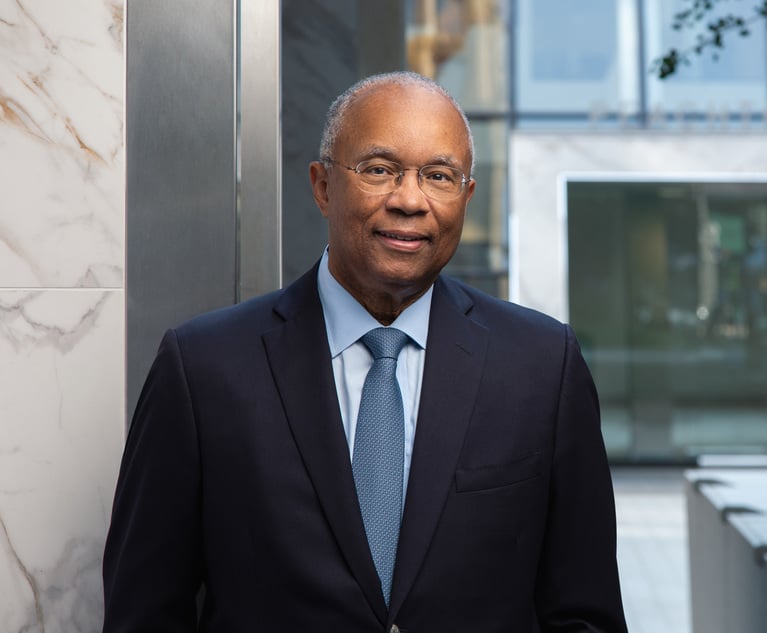Meet the GC: Matt Smith of Kids2
For outside counsel, he says, "We focus more on the individual lawyers at the firm versus the name on the firm door."
December 09, 2019 at 08:57 AM
5 minute read
 Matthew H. Smith, GC, Kids II Inc., Atlanta. (Photo: John Disney/ALM)
Matthew H. Smith, GC, Kids II Inc., Atlanta. (Photo: John Disney/ALM)
Matt Smith received undergraduate and law degrees from the University of North Carolina at Chapel Hill, clerked for a federal appeals court judge and then worked at King & Spalding, handling trademark, patent and copyright issues, for about 2½ years.
Since he left the firm in 2005, Smith has served in top in-house legal posts—first at companies in the electric industry and now at Kids2, a baby product company where he is general counsel.
Smith agreed to answer the Daily Report's questions.
What prompted you to go to law school, and what kind of law did you think you'd want to practice?
Quite frankly, early on in my college career, I didn't know what my next step would be. I knew I wanted more education and always liked the debate and negotiation aspects of the legal field (my older brother and dad are lawyers as well), so I decided on law school. Staying in Chapel Hill for another three years of hoops wasn't bad either.
As to the type of practice, working summers at different law firms allowed me to explore the real world application of academia to practice. I liked the blend of law with technology, so I jumped into intellectual property litigation.
You clerked at the U.S. Court of Appeals for the Fourth Circuit, then worked at King & Spalding for a couple of years. How did those roles lead to your going into in-house jobs at Comverge and Innovolt, which both provide technology for electrical products?
Working on the Fourth Circuit, then in the IP group at King & Spalding, allowed me to learn from some of the smartest judges and attorneys in the U.S. Both roles taught me to think outside-the-box and the need to fully understand the issues, whether deep diving on briefs at the Fourth Circuit or learning the client's business (i.e. the financial drivers, technological differentiation, competition, etc.). At K&S, I represented Comverge in the early 2000s in IP litigation, and I worked regularly with Comverge's exec team, learned the business for the better part of three years and was asked to join the company as it ramped up for its IPO.
What led you to join Kids2, and what are your primary responsibilities there?
I initially didn't know much about Kids2, as it goes to market under the brands Baby Einstein, Ingenuity and BrightStarts, but was made aware of the opportunity and reached out to explore. It is one of the larger private companies in Atlanta—and after learning more about the business and team, I was pumped about the opportunity.
I joined to be a part of a top-notch executive team and because of the company's purpose, which is to make it easier for parents to create more "tiny wins" because bright futures should be in reach for every family. Kids2 has one owner—Ryan Gunnigle—who has worked at Kids2 for over 25 years. His passion for helping new parents is contagious. I have two kids of my own—and much appreciate Kids2's purpose and vision.
As to my responsibilities, I work collaboratively with the other execs on strategy, risk management, compliance and the typical host of legal issues—litigation, employment, contracts, regulatory work, etc., which are international in nature, as we manufacture and sell across the globe.
How big is your in-house legal team?
Our Kids2 legal team is lean and mean, with three other attorneys and two paralegals, where we split the legal work by function. Kerri Braun (deputy general counsel—IP/Litigation) and Cade Daniel (deputy general counsel—Commercial/Compliance) are my partners in the group. We each have our own swim lanes but also work cross-functionally to ensure Kids2's needs are met.
How often do you use outside counsel, and what firms do you tend to use and for what kinds of matters?
We communicate with and use outside counsel daily—ranging from sole practitioners to AmLaw 100 firms. We focus more on the individual lawyers at the firm versus the name on the firm door. International regulatory work, litigation and APAC/EU commercial deals have embodied the majority of our outside counsel matters in 2019.
Having worked in private practice and now for three companies in in-house roles, what have you seen as the keys to effective relationships between in-house and outside counsel?
Knowing the end-objective, setting clear budget/scope expectations and over-communicating are keys for effective relationships between counsel. No one likes surprises, so issue spotting and strategizing on the front end are important as well. We view our outside counsel as business partners—so we expect a knowledge of the Kids2 business.
How is the legal risk environment different between your previous two companies, which served businesses, and Kids2, which sells toys to children?
The risk environment at my last two companies—selling B2B demand management and electrical devices—-was more commercial in nature. Selling kids toys and gear is more regulatory driven. Selling juvenile consumer products requires strict compliance with a host of regulations which differ by territory. Fortunately, we have a robust product integrity/compliance team, which is top-notch in the industry. The legal and product integrity teams are integrated, where we work together daily to address issues and proactively drive process and prevention.
This content has been archived. It is available through our partners, LexisNexis® and Bloomberg Law.
To view this content, please continue to their sites.
Not a Lexis Subscriber?
Subscribe Now
Not a Bloomberg Law Subscriber?
Subscribe Now
NOT FOR REPRINT
© 2025 ALM Global, LLC, All Rights Reserved. Request academic re-use from www.copyright.com. All other uses, submit a request to [email protected]. For more information visit Asset & Logo Licensing.
You Might Like
View All
Ex-Deputy AG Trusts U.S. Legal System To Pull Country Through Times of Duress
7 minute read
Q&A: UGA Law School Dean Peter 'Bo' Rutledge on His Transition Back to Private Practice
5 minute read
Morris Manning & Martin's First Chief Strategy Officer Eyes Marketing, Laterals for Growth
3 minute read
How I Made Partner: 'Begin to Build a Personal Brand,' Says Courtney Quiros of Alston & Bird
Trending Stories
- 1Will Big Law's Bet on the Middle East Pay Off?
- 2Jury Awards $3M in Shooting at Nightclub
- 3How Clean Is the Clean Slate Act?
- 4Florida Bar Sues Miami Attorney for Frivolous Lawsuits
- 5Donald Trump Serves Only De Facto and Not De Jure: A Status That Voids His Acts Usurping the Power of Congress or the Courts
Who Got The Work
J. Brugh Lower of Gibbons has entered an appearance for industrial equipment supplier Devco Corporation in a pending trademark infringement lawsuit. The suit, accusing the defendant of selling knock-off Graco products, was filed Dec. 18 in New Jersey District Court by Rivkin Radler on behalf of Graco Inc. and Graco Minnesota. The case, assigned to U.S. District Judge Zahid N. Quraishi, is 3:24-cv-11294, Graco Inc. et al v. Devco Corporation.
Who Got The Work
Rebecca Maller-Stein and Kent A. Yalowitz of Arnold & Porter Kaye Scholer have entered their appearances for Hanaco Venture Capital and its executives, Lior Prosor and David Frankel, in a pending securities lawsuit. The action, filed on Dec. 24 in New York Southern District Court by Zell, Aron & Co. on behalf of Goldeneye Advisors, accuses the defendants of negligently and fraudulently managing the plaintiff's $1 million investment. The case, assigned to U.S. District Judge Vernon S. Broderick, is 1:24-cv-09918, Goldeneye Advisors, LLC v. Hanaco Venture Capital, Ltd. et al.
Who Got The Work
Attorneys from A&O Shearman has stepped in as defense counsel for Toronto-Dominion Bank and other defendants in a pending securities class action. The suit, filed Dec. 11 in New York Southern District Court by Bleichmar Fonti & Auld, accuses the defendants of concealing the bank's 'pervasive' deficiencies in regards to its compliance with the Bank Secrecy Act and the quality of its anti-money laundering controls. The case, assigned to U.S. District Judge Arun Subramanian, is 1:24-cv-09445, Gonzalez v. The Toronto-Dominion Bank et al.
Who Got The Work
Crown Castle International, a Pennsylvania company providing shared communications infrastructure, has turned to Luke D. Wolf of Gordon Rees Scully Mansukhani to fend off a pending breach-of-contract lawsuit. The court action, filed Nov. 25 in Michigan Eastern District Court by Hooper Hathaway PC on behalf of The Town Residences LLC, accuses Crown Castle of failing to transfer approximately $30,000 in utility payments from T-Mobile in breach of a roof-top lease and assignment agreement. The case, assigned to U.S. District Judge Susan K. Declercq, is 2:24-cv-13131, The Town Residences LLC v. T-Mobile US, Inc. et al.
Who Got The Work
Wilfred P. Coronato and Daniel M. Schwartz of McCarter & English have stepped in as defense counsel to Electrolux Home Products Inc. in a pending product liability lawsuit. The court action, filed Nov. 26 in New York Eastern District Court by Poulos Lopiccolo PC and Nagel Rice LLP on behalf of David Stern, alleges that the defendant's refrigerators’ drawers and shelving repeatedly break and fall apart within months after purchase. The case, assigned to U.S. District Judge Joan M. Azrack, is 2:24-cv-08204, Stern v. Electrolux Home Products, Inc.
Featured Firms
Law Offices of Gary Martin Hays & Associates, P.C.
(470) 294-1674
Law Offices of Mark E. Salomone
(857) 444-6468
Smith & Hassler
(713) 739-1250






